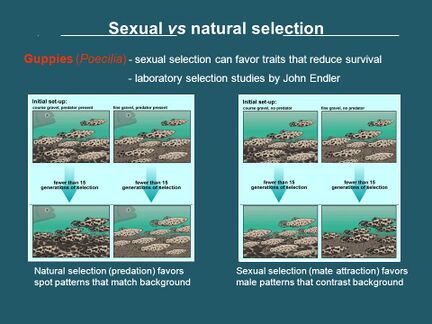Sexual selection
Selection refers to a mechanism that decides who gets to pass on their genes to the next generation. Sexual selection refers to selection done by members of the opposite sex, e.g. in accordance to their mate preferences, but the choices of parents and other family members influencing mating (e.g. arranged marriages) are also subsumed under sexual selection.
Sexual selection can increase but also decrease fitness[edit | edit source]
Biologist John Endler conducted an experiment with Guppies (Poecilia) in a tank without predators. The female fish selected males who had strong contrast to the background as they stood out during mate selection. This then made the fish more visible to predators later reintroduced into the same tank.[1][2] This clearly demonstrates that sexual selection does not necessarily further and can even reduce survival chances (fitness), and is heavily dependent on the immediate environment.
Related to this, one study showed men who have lots of sex were not healthier than others by various metrics.[3]
Unlike animals, however, which are typically very adapted to a narrow ecology, humans are highly adaptive and hence less effected by sudden environmental changes and hence less likely to face extinction due to sexual selection for superficial traits (to the extent this kind of selection is taking place at all). Technology and human intelligence has evolved to the point sudden environmental changes, such as natural disasters, global warming, weekly weather changes, etc., do not effect us as much as every other animal, due to our ability to forecast and plan for the future.
Other kinds of selection[edit | edit source]
The main kind of selection is environmental selection referring to selection done by the environment or ecology e.g. due to famines, disease or natural death, and everything else that is not sexual. The Darwin award is primarily concerned with this selection.
Further, there is kin selection, referring to how the individual influences the reproductive success of his relatives in which the individual's genes have interest in due to the genetic similarity of relatives. E.g. altruism within families may be kin selected.
Lastly, there is group selection, i.e. selection based on how the individual affects the survival and reproduction of entire groups. If a mutation results in better group survival, then that mutation may stick around because it may also (slightly) increase the individual's reproductive success. The effects of group selection are believed to be small compared to kin, sexual and environmental selection.
